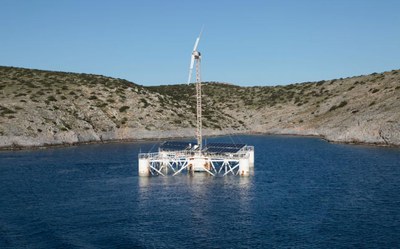To whom belongs the world? Volume 2: Water shortage on the islands Tinos and Syros

Desalination plant in Iraklia. Photo: Ourania Papasozomenou
The 33 islands of the Cyclades in the Aegean Sea are among the most popular travel destinations in Greece. Ourania Papasozomenou from Cyprus also often visits this region - but not always as a tourist. As part of her doctoral thesis in resource economics at the Albrecht Daniel Thaer - Institute of Agricultural and Horticultural Sciences at Humboldt-Universität zu Berlin (HU) she looks into the causes of and possible solutions to water shortage on two of these islands: Tinos and Syros. In the summer months the ecological system there creaks under the strain of drought and the influx of tourists, which temporarily doubles the population size. “In the summer, the islands look like the Sahara, and in winter and autumn you might think you are in Scotland”, says the young scientist. “In Tinos, water consumption rises from 1,500 cubic metres to an average of 2,700 cubic metres per person and day. The situation is very similar in Syros.”
The drinking and service water comes from the sea. “There is hardly any groundwater on these islands; 95 percent of the water comes from desalination plants.” These plants consume a high amount of energy, which means water prices are twice that of the mainland, and they are not sustainable either. “It is dirty energy from coal-fired power plants.” Sometimes, there are no spare parts for the plants, which causes further scarcity. What’s more, there is no infrastructure for utilising the purified wastewater. “The water is fed back into the sea instead of returning it into the island’s water cycle.”
However, according to a study carried out by the water expert, the islands’ technical and physical conditions are not the main cause of the unreliable and expensive water supply, but rather political reasons are. “For example, there is a regional administrative officer who has been looking to institutionalise the utilisation of rainwater for years. His idea is for each newly constructed building to have a mandatory rainwater tank”, says Ourania Papasozomenou, who as part of her thesis talked to 35 stakeholders from local government, members of the responsible ministry in Athens, water experts and environmental activists. “The legislature in Athens does not require this and instead prioritises desalination plants; the local government has its hands tied.” Because institutionally and financially, the capital has decision-making authority over the island governments (a complicated system consisting of at least three sub-levels without decision-making powers and sometimes unclear mandate).
“Given the central control and top-down structures, it is very hard for local initiatives and non-governmental organisations to set up smaller projects to solve the water problems”, says the researcher, who gained her Master's degree in Integrated Natural Resource Management at the HU. A few good measures have already been implemented: in Tinos, for example, rainwater infiltration is partly regulated by diversions with the aim of allowing larger quantities than before to seep away.

Desalination plant in Iraklia. Photo: Ourania Papasozomenou
The around 20,000 inhabitants of Syros and around 8,500 inhabitants of Tinos are accustomed to using water sparingly. They do not want to put off visitors with water-saving measures, and discreetly pointing out the water shortage has to be enough. Limiting tourism, the main source of income, to control water consumption tends to be counterproductive. “Efforts are made to spread the inrush of tourists across the whole year.”
What does the water expert, who is currently a postdoc at IRI Thesys at HU, think about the future development? “Decentralised control and independence of the local political level – both institutionally and financially – are a promising approach to improving the situation. Unfortunately, it does not look like this is going to happen any time soon.”
Author: Ljiljana Nikolic
Further information
For a more detailed look at the topic: Ourania Papasozomenou’s doctoral thesis (“The Water Crisis in the Greek Island Complex of the Cyclades: Diagnosis, Analysis, and Rectification”) will be available on the edoc server of Humboldt University from autumn.
Website of Ourania Papasozomenou
Contact
Dr. Ourania Papasozomenou
Postdoctoral Researcher at IRI THESys
Humboldt-Universität zu Berlin
Phone: +49 30 2093-66328
papasoou@cms.hu-berlin.de
